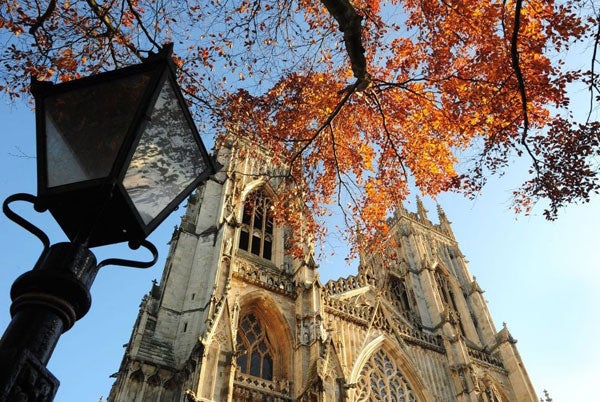If you're interested in preserving the environment, English Heritage will train you

I could go on all day about my job," says Clara Turlington, "it's hard not to be enthusiastic about it." It's not often that you hear people speak with such passion about their work, but not everyone gets to hold their morning meetings in stately homes or hike up the highest peaks and be paid for it. York-born Turlington is a trainee on English Heritage's Historic Environment Managers scheme, an experience she describes as "exceptional and unparalleled".
What makes it so good? English Heritage launched the two-year scheme in 2008 after a modest increase in government funding. "English Heritage had long had aspirations to establish a scheme to train professionals entering conservation," says Steven Bee, the director of planning and development at English Heritage.
"The programme equips trainees with the necessary knowledge of the various elements of heritage conservation and offers them the opportunity to gain practical experience. Perhaps, most important, it enables them to appreciate that conservation is a means of managing change rather than blocking it, and of capturing the investment necessary to sustain the long-term future of historic places by ensuring that they help to meet the needs of people today and tomorrow."
English Heritage is the Government's statutory adviser on the historic environment and works with a wide range of government departments. The two-year historic environment management scheme is divided into units, some of which are core subjects, such as heritage protection. Students then choose four out of a further six subject areas, including architecture, historic buildings, archaeology, landscape and planning. "This approach," says Turlington, "has enabled me to tailor the scheme towards my own particular interests and career aspirations."
Before Turlington joined the scheme, she studied politics and international relations at Lancaster University, followed by an MSc in town planning at Newcastle University. While working happily for the North Yorkshire Moors National Park Authority, she was idly browsing the English Heritage website when she spied an ad for the scheme. "It appealed to me immediately and fitted in perfectly with the stage I was at in my professional career," she says.
Turlington was one of the first to join the scheme so no one knew what to expect, least of all her, but her instinct told her it was an opportunity not to be missed. In her role, Turlington – who's about to start a two-month secondment with York City Council – works closely with English Heritage in the Yorkshire and Humber region, work-shadowing, assisting with research for cases and drafting advice, as well as getting to grips with the practical, ethical and legal challenges facing the heritage sector. "I realise now that I never fully appreciated the diversity of work that English Heritage covers as the Government's statutory adviser on the historic environment," she says.
Within her first year, Turlington had been on a range of site visits – from hiking up the second-highest peak in the Yorkshire Dales to considering management issues of a scheduled monument to discussing the design of new development in historic areas within the highly-graded buildings.
As a trainee, Turlington has to manage her own English Heritage project and she has decided to focus on the effectiveness of green belts in England at preserving the setting of historic cities. "This is a project English Heritage has wanted to complete for some time," she says, "and it allows me to use my specialist knowledge of the planning system and conservation."
Traineeships: How to apply
* There are up to 10 traineeships each year, lasting two years
* The 14 trainees working with English Heritage are based across the country in the following offices: Birmingham, Bristol, Cambridge, Guildford, London, Manchester, Newcastle and York. All the traineeships are validated by English Heritage
* To undertake a traineeship, you should have a degree in a relevant subject such as archaeology, architecture or conservation. However, non-graduates with relevant work experience are encouraged
* Salaries range from £18,000 to £23,000 a year, depending on a trainee's experience and location
* To apply for next year's scheme visit www.english-heritage.org.uk/jobs
Subscribe to Independent Premium to bookmark this article
Want to bookmark your favourite articles and stories to read or reference later? Start your Independent Premium subscription today.

Join our commenting forum
Join thought-provoking conversations, follow other Independent readers and see their replies